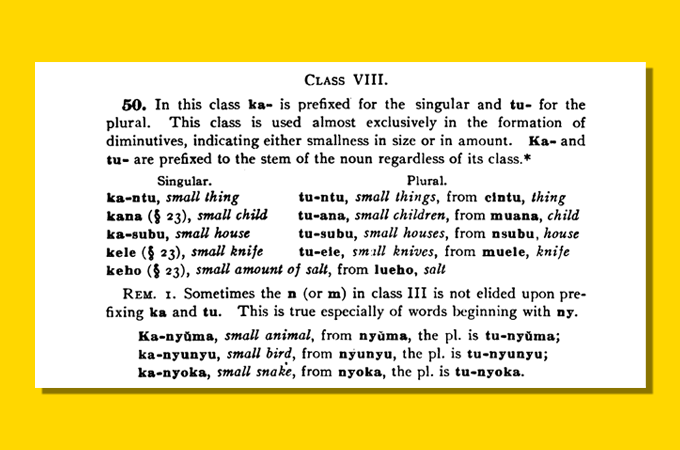Blog > Grammar > The Ka-Tu Tshiluba Noun Class

The Ka-Tu Tshiluba Noun Class
There are a total of eight different noun classes in Tshiluba. The Ka-Tu noun class is particular in that it is used for the formation of diminutives.
Lire En Français
 Credit: Grammar and Dictionary of the Buluba-Lulua Language - W.M. Morrison (1906)
Credit: Grammar and Dictionary of the Buluba-Lulua Language - W.M. Morrison (1906)
The inflection of nouns is made not by suffix terminations, as
in the Indo-European system of languages, but by the use of prefixes. In this class, ka- is prefixed for the singular and tu- for the plural. This class is used almost exclusively in the formation of
diminutives, indicating either smallness in size or in amount. Ka- and
tu- are prefixed to the stem of the noun regardless of its class.
| Singular |
|---|
| ka-ntu, small thing kana, small child ka-zubu, small house kele, small knife ka-bwa, small dog |
| Plural |
|---|
| tu-ntu, small things, from tshintu, thing tu-ana, small children, from muana, child tu-zubu, small houses, from nzubu, house tu-ele, small knives, from muele, knife tu-bwa, small dogs, from mbwa, dog |
Sometimes the n ( or m ) class is not omitted when prefixing ka and tu . This is true especially of words beginning with ny.
Ka-nyama, small animal, from nyama, the pl . is tu-nyama ;
ka-nyunyu, small bird, from nyunyu, the pl . is tu-nyunyu;
ka-nyoka, small snake, from nyoka, the pl . is tu-nyoka.
Some words used in the pl. to express bulk or quantity employ the corresponding diminutive pl. when a small quantity is meant. Hence we have tuyi, a little water, from mayi, water; tuamvua, a little corn, from mamvua, corn; tuluvu, a little palm-wine, from maluvu, palm-wine; tuanyi, a little oil, from manyi, oil ; tutamba, a little greens, from matamba.
Some words employ the diminutive prefixes without having the diminutive idea; as, kapumbu, elephant, tupumbu, elephants; kabalu, horse, tubalu, horses; kapia, fire, tupia, fires.



